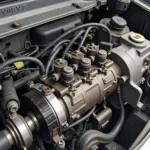When that dreaded check engine light throws a wrench in your day, and your trusty OBD2 scanner spits out a catalytic converter-related code, you know it’s time to face the music (or rather, the lack thereof, considering your car’s muffled exhaust note). But fear not, intrepid driver! Finding an “OBD2 catalytic converter for sale” doesn’t have to turn into a vehicular headache.
This comprehensive guide dives deep into the world of catalytic converters, demystifying the process of choosing the right one for your vehicle. From understanding OBD2 codes to navigating the market, we’ll equip you with the knowledge to make an informed purchase and get your car back to its purring best.
Deciphering the OBD2 Codes: What’s Your Car Trying to Tell You?
Before you start shopping for “OBD2 catalytic converters for sale,” it’s crucial to understand what your OBD2 scanner is trying to tell you. OBD2 codes related to catalytic converters can indicate a range of issues, from a simple oxygen sensor malfunction to a completely clogged catalytic converter.
Here are some common OBD2 codes associated with catalytic converter problems:
- P0420: Catalyst System Efficiency Below Threshold (Bank 1)
- P0430: Catalyst System Efficiency Below Threshold (Bank 2)
- P0421: Warm Up Catalyst Efficiency Below Threshold (Bank 1)
- P0431: Warm Up Catalyst Efficiency Below Threshold (Bank 2)
These codes essentially indicate that the catalytic converter isn’t doing its job effectively – converting harmful exhaust gases into less harmful ones. However, don’t jump to conclusions just yet! While a faulty catalytic converter is a possibility, these codes could also point to other culprits:
- Malfunctioning oxygen sensors: These sensors monitor the exhaust gases and help regulate the air-fuel mixture. A faulty sensor can send incorrect signals, triggering a catalytic converter-related code.
- Exhaust leaks: Leaks in your exhaust system can disrupt the flow of exhaust gases, impacting the performance of the catalytic converter and triggering a code.
Navigating the Market: Types of OBD2 Catalytic Converters for Sale
Once you’ve pinpointed the root cause of the problem (hopefully with the help of a qualified mechanic), and a catalytic converter replacement is in order, it’s time to explore your options. The market offers a variety of “OBD2 catalytic converters for sale,” each with its own set of pros and cons:
1. OEM (Original Equipment Manufacturer) Catalytic Converters
- Pros: These are identical to the catalytic converter that came with your vehicle, ensuring optimal compatibility and performance.
- Cons: They tend to be the most expensive option.
2. Aftermarket Catalytic Converters
- Pros: Offer a wider price range and can be significantly cheaper than OEM converters. They come in various designs and materials, allowing for some customization.
- Cons: Quality and durability can vary significantly depending on the brand and manufacturer. Be sure to choose reputable brands with proven track records.
3. Universal Catalytic Converters
- Pros: These are designed to fit a wide range of vehicle makes and models, offering flexibility and often lower prices.
- Cons: They may require modifications during installation, potentially increasing labor costs. Performance may not be as optimized as OEM or high-quality aftermarket converters.
Key Considerations When Choosing an OBD2 Catalytic Converter
With numerous “OBD2 catalytic converters for sale,” selecting the right one can seem daunting. Keep these crucial factors in mind:
- Vehicle Compatibility: Ensure the catalytic converter is designed to fit your specific vehicle’s make, model, and engine size. Check the product description or consult with a mechanic to confirm compatibility.
- Emissions Standards: Different states have different emissions regulations. Ensure the catalytic converter meets the requirements for your state. Look for EPA-approved or CARB-compliant converters.
- Material and Construction: Catalytic converters are typically made from stainless steel or aluminized steel. Stainless steel offers better corrosion resistance and longevity but comes at a higher price.
- Warranty: A good warranty provides peace of mind and protects you from premature failures.
- Price: While it’s tempting to opt for the cheapest option, remember that quality and longevity are crucial. Balance cost with durability and performance considerations.
Beyond the Purchase: Installation and Maintenance
Finding the right “OBD2 catalytic converter for sale” is just the first step. Proper installation is vital for optimal performance and to avoid future problems. Consider having the catalytic converter professionally installed, especially if you’re not comfortable working on your vehicle’s exhaust system.
Once installed, follow these maintenance tips to prolong the life of your catalytic converter:
- Address engine issues promptly: Issues like misfires, oil leaks, or a faulty oxygen sensor can damage the catalytic converter. Address any engine problems immediately to prevent further damage.
- Use good quality fuel and oil: Using the recommended fuel and oil for your vehicle helps ensure optimal engine combustion, reducing the strain on the catalytic converter.
- Avoid driving over obstacles: Hitting curbs, potholes, or speed bumps can damage the catalytic converter. Drive cautiously and avoid rough roads whenever possible.
By following these tips, you can maximize the lifespan of your new catalytic converter and enjoy smoother, cleaner driving for years to come.
Remember, while finding “OBD2 catalytic converters for sale” might seem like navigating a labyrinth of technical jargon and choices, armed with the right information, you can confidently choose the right one for your vehicle and bid farewell to those pesky check engine lights.
